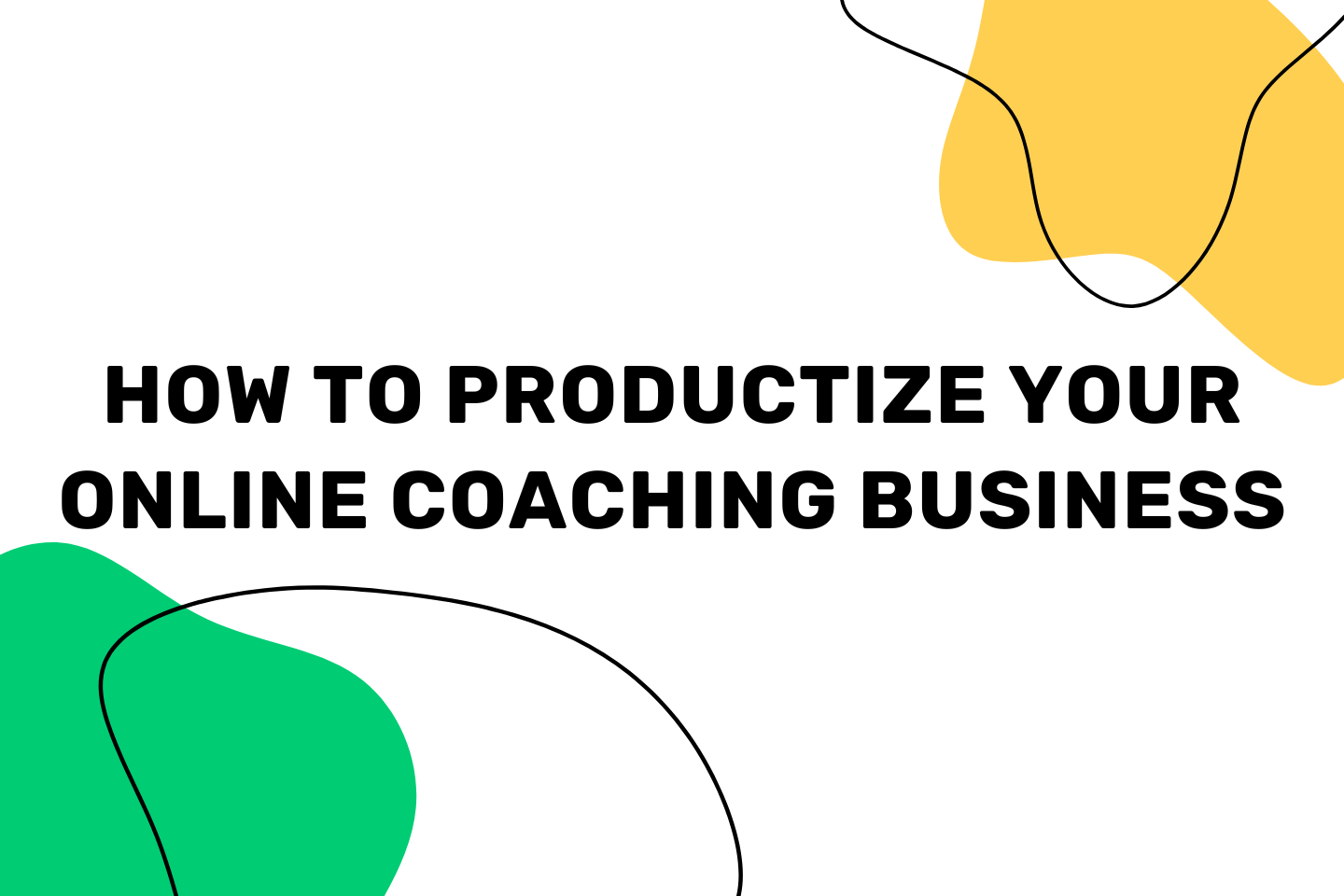Have you considered productizing your online coaching business?
If you could package your online coaching services more like products, how beneficial would this be to you? While exploring the advantages of productizing your online coaching business, I’m going to provide you with some practical advice from the first-hand experience on how to restructure your business around the innovative and forward-thinking productization model.
My name is Tyler Gillespie, The Thinking Time Chief at Productized Services. My insights and perspectives come from nearly a decade of experience scaling and selling multiple productized service businesses. Through the power of systemization, I have built service businesses that have been immensely profitable, scalable, and easy to exit.
With a streamlined and predictable process, a productized coaching business can easily be scaled. At the same time, productizing your service will help you to build a business that could be sold further down the line. When all the right systems are implemented, you can distance yourself from the daily operations of the business. This can prove to be attractive to customers.
To build an irresistible productized offer, you need to become skilled in the art of removing the non-essential. As I will discuss shortly, the productized service model is characterized as incredibly focused and predictable. The two traits go hand-in-hand and this is something I’m going to explore in the article. Without wasting any time, let’s dive straight in.
Why Does Productization Matter To Your Online Coaching Business?
The average online coaching service involves working closely with potential customers to craft a customized solution to meet their needs. While extensive customization and tailoring can lead to high levels of customer satisfaction, it’s often inefficient and rarely scalable. When every customer gets a slightly different solution, this can get out of hand as you begin to grow the business. You only have so many 1:1 hours available before you max out.
While many businesses steer away from delivering one-size-fits-all solutions, productized services operate under a different philosophy. Rather than developing a bespoke solution for every customer, productized services encourage your customers to move forward with a set offer.
Simplifying your offering can alter the trajectory of your coaching business.
With everyone buying the same service, you can easily predict how much customer service support will be required for each customer. You will also rely on the same processes to meet the needs of the individual customers. This adds repetition to your business, helping you to consistently deliver the same outcomes across the board.
When you’re repeatedly going through the same processes to meet customer needs, you can begin to examine these processes and refine them. It’s far easier to optimize the operations of a repeatable process than a process with many different variables. It’s all about keeping things simple. With fewer workflow variables to consider, productized services are easier to optimize.
Productization sits somewhere between a product and a service, combining the best elements of both models.
Much like a product-based offering, a productized coaching business…
- Successfully solves pain in a repeatable way.
- Is often relatively easy to market.
- Demands greater control over quality.
- Is scalable
Much like a service-based offering, a productized coaching business also…
- Focuses on a specific activity or process.
- Can potentially be launched with less capital.
- Delivers the service through customer interaction.
While you may not be creating a solution that’s unique to each customer, you can certainly market your service as being unique to each customer during sales conversations. This can be achieved by appealing to the specific needs of each customer. Even though there may be a clear-cut problem that your service addresses, it can still have different levels of impact.
The Ultimate Secret To A Successful Productized Service
To run a successful productized coaching business, I’m going to let you in on a secret – and it’s something that few business owners adopting this model are acknowledging.
Focus is the secret ingredient to the success of your productized service. Without it, you will allow ‘scope creep’ to plague your operations, resulting in inefficient, dysfunctional workflow fires. When you start to expand your service offering beyond your clearly defined processes, things can quickly turn into a complete mess – with bespoke solutions for every customer. This is what we want to avoid.
Focus on selling outcomes and fixed deliverables.
When you’re trying to grow your productized coaching business, it can be tempting to stray away from your clearly defined packages and pricing plans to meet the needs of potential customers. From selling your services at discounted rates for certain customers to adding bolt-on solutions to meet their specific needs, you can quickly end up creating future internal fires.
If you’re going to do this the right way, you must strip the productized service down to the essential. This means cutting back on additional bolt-on solutions and focusing on delivering a repeatable service with clear deliverables. From who you’re serving and the problem they want to solve to the steps you’ll take to solve this problem, you need to understand these core components.
Do you want to run a productized service or a customized bespoke service?
This is the question you need to ask yourself. One of these models is lean and highly efficient, while the other has the potential to suck up your time and quickly turn into an utter nightmare. If you want to transform the trajectory of your coaching business, change begins with altering the positioning of your coaching offering.
To avoid the risk of your customers asking for bespoke and custom solutions, you should set some clear expectations from the outset. This begins with your service offering. If customers know they’re about to purchase a set package, they’re less likely to ask for bolt-ons. You can still go above and beyond for your customers by delivering a single (and repeatable) solution.
They might ask for additional support, but this doesn’t mean you should agree to this. If you start to break away from your set processes and internal mechanisms, delivering a scalable service will only become more challenging. To the greatest possible extent, you should keep things simple by offering a set package, set outcomes, and set tangible deliverables for all customers.
In the early days of adopting the productized model, focusing on delivering a single solution will help you to grow quicker, even if this means turning down potential customers that aren’t a good fit for your productized service. You have to be ruthless about this. Otherwise, adopting the model will be pointless. You can’t be half in and half out. It’s about being bold and sticking to the plan.
The greater emphasis you can place on delivering a packaged coaching solution, the more successful your service is likely to be. To ensure you have a good product-market fit, you must spend time understanding the needs of your ideal customer. You could achieve clarity on this by conducting interviews with those who perfectly fit your customer avatar.
The Best Productized Structures For Online Coaches
How can an online coaching business be productized?
Fundamentally, there are two different types of productized offer structures to consider. Let me break them down for you.
One-Time
One-time productized offers are standalone solutions. These can be implemented and delivered over a set period of time. Reviews, audits, and consultations are all examples of one-time offers that can easily be productized. Fortunately, coaching services can be relatively simple to try and productize. This is because they are typically structured with little to no customization.
While one-time productized offers have their place, online coaching businesses should steer towards offering packages of calls on recurring packages. These could come in the format of done-with-you programs to essentially create an extended timeframe. Rather than offering one-time hourly calls, recurring packages add predictability to your income. As well, sets the expectation of an ongoing commitment.
Most online coaching businesses usually consist of one-time sales with a package of calls. This isn’t a scalable offering and should be avoided. The goal is to not only productize your offering but begin to build more leverage into your products as the business owner. The goal is to move away from direct 1:1 offerings and into leveraged 1:1 offerings with more value for both parties to start.
Source: Work With Sian
Recurring
Recurring productized offers are ongoing and provide customers with a continuous solution to a persistent problem. This is where you provide services for as long as the customer requires. Rather than having contracts with lengthy commitments, most recurring productized solutions have customers paying a single monthly, quarterly, or annual fee with no further commitments.
If you want to experience the compounding effects of growth, you should consider developing a recurring productized offer. As long as you can keep customer churn low and inspire retention, your monthly subscription revenue will begin to compound. This can help to add a level of predictability to the revenue being generated by your online coaching business.
It’s important to note that these two offer structures can co-exist. For instance, you could get customers through the door with a one-time offer and then get them hooked on a recurring subscription. You will need to think carefully about combining these two structures to create a high-value offer and value ladder. As you learn more about the needs of your target market, your offer may naturally evolve.
Source: Hub Health
L1:1
L1:1 is working 1:1 with a customer while leveraging pre-existing content. This content may come in the form of a done-with-you program that includes tutorials and walkthroughs. When you’re leveraging various types of pre-packaged content to enhance the customer experience, you will end up sacrificing less of your time on all-consuming 1:1 sessions.
1:M
1:M is leveraging grouped coaching and training. Rather than hosting 1:1 sessions, you should consider the potential impact of grouping your sessions and working with multiple customers in a single session. Depending on the nature of your online coaching business, creating cohorts could add value to the customer experience and save you a significant amount of time.
Are you looking to productize your online coaching business?
I’m actively supporting a small group of business owners, including several agency founders, to enhance their growth potential. If you’ve been running an online coaching business, I’d love to talk with you about the possibility of productizing your service.
The above content is just the tip of the iceberg when it comes to positioning, offers, and ideas around structuring your coaching business for success.
Have you been dreaming about turning six-figure years into six-figure months? You should check out some of the free resources I have around productizing your service business here. I hope you’ve enjoyed a taste of my insights with this article. Keep building!

